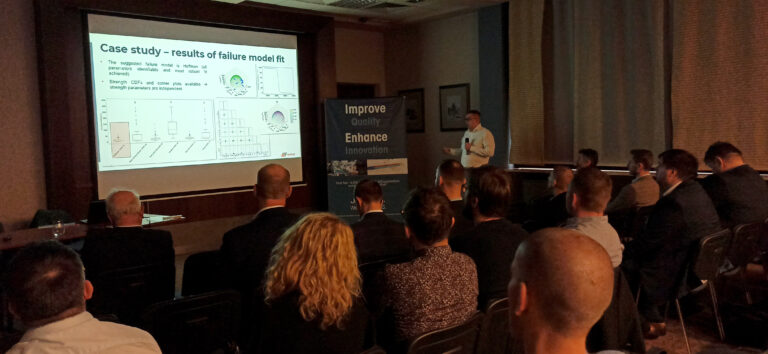In his presentation at the two-day NAFEMS Eastern Europe Conference in Krakow, Kristóf Szalai, Simulatio Engineer at Econ, showcased the company’s latest development, a unique method and software implementation for data-driven high-accuracy parameter fitting of simulation material models of reinforced and unreinforced polymeric materials.
In his presentation titled ‘Automated data-driven method for nonlinear material modell fitting for composites‘ he showcased the latest development of Econ Engineering, a unique methodology and software implementation to provide high-fidelity data-driven fit of the constitutive material model parameters for reinforced and unreinforced polymers for simulation purposes.
This revolutionary innovation significantly improves the accuracy of polymer materials simulation and has a wide range of applications in the fields of mechanical engineering, automotive, and aerospace. The first release of the software is expected to launch in early 2025!
The two-day conference included sessions on system simulation, fluid dynamics, and thermodynamics.
The NAFEMS Easter Europe Conference event was held on 24-25 April in Krakow, Poland, where Econ was represented. The conference is the premier event for the simulation engineering community in the region, where experts gather to share the latest research and developments in engineering simulation and modeling.
The international NAFEMS Eastern Europe Conference has provided an outstanding platform for Econ Engineering to present its new R&D developments to a professional audience. The presentation by Kristóf Szalai, Econ’s Simulation Engineer, took place in the structural mechanics session following the plenary, where a total of 12 presentations were given.
Essence of the presentation
The reliable estimate of material properties for Finite Element (FE) simulations is a must to provide a high-accuracy estimate of the behavior of the product being developed. With high-fidelity simulations, the level of virtualization can be substantially increased which leads to shorter development time, reduced prices, and carbon footprint. The issue summarized above especially persists in terms of the reliable simulation of the behavior of Continuous Fiber Reinforced Plastics (CFRP). The standard linear constitutive models available in commercial FE codes are seldom applicable to predict the mechanical response around failure due to the non-negligible nonlinearity. In addition, there are no guidelines available nowadays on how to convert the failure information from mechanical experiments into abstract parameters of multiaxial failure models available in the portfolio of commercial FE codes. The current presentation introduces data-driven optimization and parameter fitting techniques to find nonlinear constitutive model constants and multiaxial failure model parameters of a unidirectional (UD) composite material via the automated and holistic processing of a set of raw data from mechanical experiments. The system can find the pre-selected nonlinear constitutive model parameters on a probabilistic basis using Bayesian optimization and is also capable of analyzing the available raw experimental information from parameter sensitivity and identifiability aspects concerning the potential multiaxial failure model constants to fit. As a result, it can provide suggestions about the most reliable and robust model to fit in an automated way. The capabilities of the parameter evaluation technique are demonstrated via the example of a set of virtually generated standard and non-standard mechanical experiments on UD coupons.
Econ is committed to developing innovative solutions in engineering analysis and has several R&D projects of its own.
You can read more about our activities in this area here: https://econengineering.comcompany-info/professionalism/#tenders
For more information about this project, please contact us!




